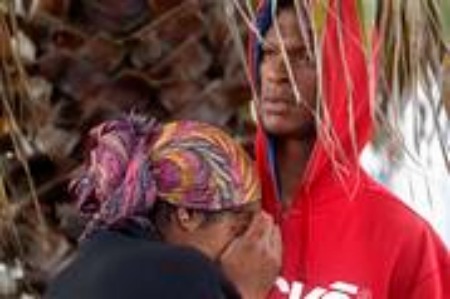
MARIKANA, South Africa (AP) — Grieving families Thursday mourned the deaths of 34 striking miners killed by police, as South Africans demanded the arrests of those who gave the orders for the shootings.
Memorial services are being held across the country for the victims of the worst state violence since the end of apartheid in 1994. Many have called for South Africans to honor all those killed in a country with one of the world’s highest murder and rape rates.
More than 1,000 people attended the memorial service arranged by the government in Marikana, 70 kilometers (40 miles) northwest of Johannesburg.
The relative of a miner killed in last week’s shootings said he wants to see some arrests.
“If it were me I’d want everyone who was involved in this incident including the mine managers to be arrested, the whole lot of them, because a person’s life is not worth money,” Ubuntu Akumelisine told the AP.
Mungiswa Mphumza, the sister of a dead miner from Eastern Cape, said she was at peace.
“We have accepted everything that has happened and we ask that the dead rest in peace, there is nothing that we can do at the moment, what has happened has happened. God takes what he likes,” Mphumza said.
Roger Phillimore, chairman of Lonmin PLC mine company, also offered condolences to the the mourners.
“It is with huge sadness that I join with you to mourn the loss of so many of our colleagues. It is unquestionably the saddest loss in the history of this company,” Philimore said.
This was the first time since the shooting that a high-ranking Lonmin official made a public statement.
President Jacob Zuma called on the nation to commemorate not only the miners but all victims of South Africa’s violence.
Thirty-four miners were killed last Thursday when police opened fire on charging strikers. Another 10 people, including miners and police officers, died in the days before.
The day should be an opportunity for the nation to “mourn and promote a violence-free society,” said Zuma in a statement. The president did not attend any of the memorials.
South Africa was encouraged a Johannesburg university to reflect on recent violent killings, including the mine violence and the stoning of three orphaned children in Limpopo province.
“This ongoing violence is a part of our national and collective shame and we should take this time to seriously reflect on the state of our society, and to disturb the conscience of our community,” said Yunus Ballim, a spokesman for Witwatersrand University.
Zuma announced Thursday that an official inquiry will probe “the facts and circumstances which gave rise to the use of force and whether this was reasonable and justifiable in the particular circumstances.”
Zuma on Wednesday night demanded that mine companies provide decent homes and sanitation for miners. He singled out one mining house where 666 workers share four toilets and four showers, according to the Star newspaper. He did not name the company.
Zuma warned that those who do not comply with the Mining Charter requiring adequate housing risk losing their licenses.
The president said it was not a time for pointing fingers in last week’s shooting deaths.
“I won’t judge the incident. The judicial commission of inquiry will do so,” he said at a lecture in North West Province, home to the country’s troubled platinum mines.
Expelled African National Congress Youth League leader Julius Malema, a fierce critic of the Zuma administration, attended the memorial.
Malema slammed the government.
“Government has failed to get involved, because they are involved in the mine. This is a mining revolution and we will not surrender,” Malema said, the South African Press Association reports.
Malema called for Zuma’s resignation to cheers.
Earlier this week, Malema joined miners as they went to file a criminal case of murder against the police for the shootings.
The Association of Mineworkers and Construction Union (Amcu), one of the unions included in the dispute, called for an inquiry independent from Zuma’s initiative.
“As much as the president of South Africa has called for a commission of inquiry, we are not different to that, but what we are calling for is an independent and outside body that could deal with the root cause of this matter,” said Amcu secretary Jeff Mphahlele. “We do not trust the terms of reference of the inquiry ordered by Zuma.”
Amcu held its own memorial service Thursday morning near Marikana.
The U.S. Ambassador to South Africa has offered condolences to the nation, flying the U.S. flag half-staff in solidarity with the rest of the country.
“The U.S. Mission to South Africa joins the people and government of South Africa in mourning the lives lost to violence last week,” said Donald H. Gips, the U.S. Ambassador to South Africa, in a statement.
Operations at the Royal Bafokeng mine resumed on Thursday after miners went on strike the day before claiming higher wages.
Lonmin, the mine where the violence happened, remained shut down to honor the day of mourning.
Copyright 2012 The Associated Press.
Photo Caption: Mourners attend a memorial service at the Lonmin Platinum Mine near Rustenburg, South Africa, Thursday, Aug. 23, 2012 after police shot and killed 34 striking miners and wounded 78 last week. Demands for higher wages spread to at least two other mines, raising fears of further protests at more South African mines that provide most of the world’s platinum. (AP Photo/Denis Farrell)